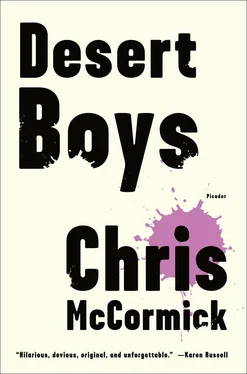I wanted to punch him in a friendly way, let him know I was still listening, still someone he could talk to. But I feared Watts would understand my hitting him as an indictment of what he’d done, and I knew he deserved much more than a punch. The haloed headlights of an oncoming car grew ahead of us. I asked Watts how this had anything to do with Roxanne.
“The whole time my dad was on the phone with the immigration officer, he kept saying that his son, Danner, was the hero. I’m not going to lie, Kush. I felt proud. For a few weeks, I felt like a fucking patriot. Only later did I start feeling sick. I fucked up a man’s life — and his family’s, too — because he called my dad fat. Jesus. I was really sick with guilt, man. I started going to church more and more, tried to atone, but I couldn’t tell some stranger what I had done. God, I wish you or Karinger were around, because I was crying like a fucking idiot and ashamed and I needed someone to talk to. In person, I mean. So I went to Roxanne. I picked her up and we drove to the aqueduct, and I told her everything. After a while, she just stared at me, like she’d never seen me before. Then she told me to take her home. We haven’t talked since.”
The oncoming car passed, flooding us momentarily in white light.
“She’s the only reason I still love being here,” Watts said. Then he said it again. “I really love her, Kush. I really do. And I need her. I need to fix this. I don’t know how, but I need to fix this.”
I looked at my friend beside me, the one who stayed, and I knew what I had to do. I wanted to believe good men could do despicable things and remain good men. I wanted to believe this place was better for having him.
“I can fix it,” I said.
“You can?” he said.
“I think so.”
“What can I do to help?”
“Nothing,” I said. “Remember your motto: Just be there. Then we’ll see what happens.”
* * *
One of the poems Robert Hass read the day I stole the wine began, “In one version of the legend the sirens couldn’t sing.” That’s how I felt that night, just being there with Watts at the Karinger house, unable to lure the story closer. We parked across the street, knowing we couldn’t do anything but watch the unlit windows. This wasn’t a movie. We couldn’t get out of the car and call Roxanne’s name. We couldn’t perform a grand apologetic gesture. We couldn’t even apologize, simply. We couldn’t predict the future, which was that Watts would go on to save more lives than he damaged. We couldn’t reverse the deportation of the undocumented worker. We couldn’t do what Karinger would’ve done, concoct an extravagant plot to prevent further deportations by splashing bleach across the lawns of the Antelope Valley, heightening the demand for workers. We couldn’t continue to demonize Seth Watts, and I couldn’t balk when his son, understanding how flatly he’d portrayed him, began reciting a litany of genuinely redeeming qualities. We couldn’t say another word about mothers, though we thought about ours constantly. We couldn’t spend all night parked at the Karinger house, waiting for a girl to emerge and absolve us of our sins, and we couldn’t regret turning the truck around eventually, back through that flashing red, to get some rest before my departure.
All we could do was return to our lives. Only then, from the distant Oakland Tribune offices, could I go through with my plan. I wrote an email to Roxanne Karinger explaining how Watts had taken the blame when in fact the deportation was my fault. I’d been doing research for an article, I lied, calling out small-business owners exploiting illegal labor. I’d been the one who discovered the undocumented status of the worker, and Seth Watts deported him on my notice. Why Watts would cover for me, I wrote, I couldn’t say. Why do friends do anything for each other?
Roxanne never replied to my email, but the plan worked. Watts, grateful, kept me informed. Roxanne thought what I had done was disgusting and inhumane. Journalism, she concluded, was nothing but self-promotion. At last she understood why her brother stopped talking to me, and would never take my side again. Still, she could see why Watts would stay in touch with me after all these years — she admired his loyalty. Anyway, the truth was she hadn’t been that upset about the deportation in the first place. She could see now that she’d used the opportunity to take a “much-needed break” at a “difficult time” in her life. Later, with her brother visiting between deployments, and with the inception of her new, adult life fast approaching, she felt ready to stop keeping her love for Watts a secret, which was the true issue at the heart of their struggle. Watts agreed. And the nameless worker who’d been arrested and deported soon became simply another part of their story, important only in the most fleeting way: that he had been there, and then one day, he wasn’t.
THE COSTS AND BENEFITS OF DESERT AGRICULTURE
For a brief but memorable time I belonged to an organization at my high school called, ridiculously, the Future Farmers of the Antelope Valley. Ridiculous, because I believed at the time that neither farmers nor the Antelope Valley had much in terms of a present tense, let alone a future. But I needed a noncompetitive extracurricular for college applications. So, twice weekly after school, I met with the group, led by an actual, visiting farmer, boots and hat and all, named Reggie Nelms.
Reggie spoke to us about farming in general, but desert agriculture in particular. You’d be amazed at how many of the kids appeared legitimately shocked when he informed us that water was hard to come by in the Mojave Desert. We were the product of the population boom of the late ’80s and early ’90s; our neighborhoods were so paved over with shopping centers and tract homes, we sometimes forgot about the biblical ecosystem lying beneath all that concrete. Reggie said, “When you shower or flush, do you think for even a minute about the finite source of that water?” We didn’t. He accused us of not seeing value in anything we couldn’t scan under a price-checker. Then he handed out black permanent markers and told us to draw bar codes on our faucets at home.
I immediately trusted Reggie, who looked like a baseball manager in the wrong costume, eyebrows all bristled like misplaced mustaches. He was a workingman in his late fifties, which meant people had begun to feel for him again after a long drought of sympathy, and since no one else on that first day seemed interested in asking him a question, I threw him a softball.
“Where does all our water come from, Mr. — ?”
“Just Reggie,” he said. Then: “Aside from the all-too-occasional rain, my alfalfa farm is run on a combination of what are known as aquifers — pumped underground — and imported water via the aqueduct.”
A number of us recognized the man-made river in the hills above town not as a source of water, but as a destination, grinning at one another as if to say, Remember that time at the aqueduct .…
Eventually, in the most casual of tones, as if he had no idea how mystifying all of this was to a group of suburban desert kids, Reggie arrived at some general dos and don’ts about farming alfalfa. Starting out, for instance, make sure your pH is over six and a half. Keep an eye out for armyworms and weevils and — if you’ve got horses — blister beetles. They’ll come for the alfalfa and stay for the hay.
The other bit of advice he offered at the end of every meeting: Cultivate a large family. I always thought he was talking shop here, too: children as indentured workers. But he meant otherwise. I learned later that he and his wife, Allison, never had children, and he didn’t realize until she’d passed what a mistake that was.
Читать дальше












